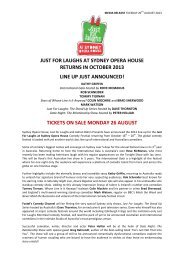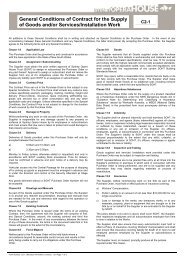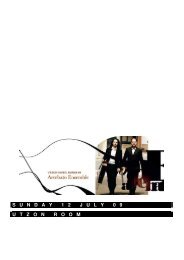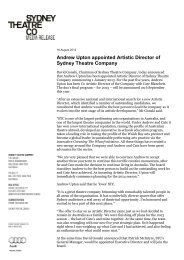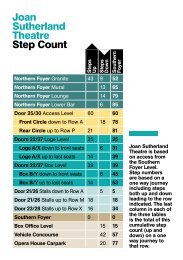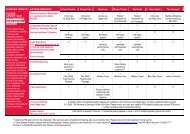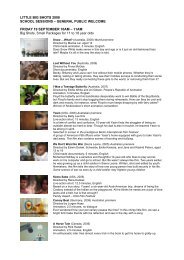Stage 3 - Sydney Opera House
Stage 3 - Sydney Opera House
Stage 3 - Sydney Opera House
- No tags were found...
Create successful ePaper yourself
Turn your PDF publications into a flip-book with our unique Google optimized e-Paper software.
SYDNEY OPERA HOUSEDISCOVER THE STAGEGuidelines for Classroom DramaGOOD WEBSITES:Drama Resourcedramaresource.comDrama NSWdramansw.org.auTeach Kids Drama Stuffteachkidsdramastuff.com/index.htmlDrama in the classroom can be used to support learning in avariety of key learning areas by giving students the opportunityto explore ideas and issues in a meaningful and realistic manner.Drama has been considered to assist with the development ofself-esteem, communication skills, problem-solving abilitiesand in the development of focus and team building through funactivities.Incorporating drama in a primary school classroom presents anumber of challenges for teachers, but reaps many rewards for allinvolved when attempted. The following suggestions are designedto provide some food for thought in relation to doing drama in theclassroom and are intended as a guideline only.When doing drama in the classroom ensure:A clear work space is available for the drama activity.If desks can not be moved in the classroom, try to use the hall or outside open area.You talk to the students about the creation of a ‘safe space’. In this space students don’t laugh at each other, butsupport and encourage (forming a circle at the beginning and end of a session or sitting with eyes closed are simpleways to focus students for a drama session).You incorporate a reflection session at the end of every drama activity. This allows the students to consider what hasbeen done and take more meaning away from the activity than it just being fun (which it will be!).You are firm with the students. If a student does not follow instructions, they should be removed from the activity. Thiswill allow the other students to see that you as the teacher are assisting in maintaining the safe space for them to work.You always begin every drama session with a warm-up. This could include a focus activity, drama game or pure physicalwarm-up. There are good books and websites available with suggestions of warm-up activities and drama games.Don’t be afraid to participate in the activities yourself. The students like to see you as the teacher taking a role in anactivity. This can also allow you to help any improvisations or role plays flow and move forward more easily.(Dorothy Heathcote’s work on Mantle of the Expert and Teacher in Role discusses this in more detail).8house:Ed 2012




